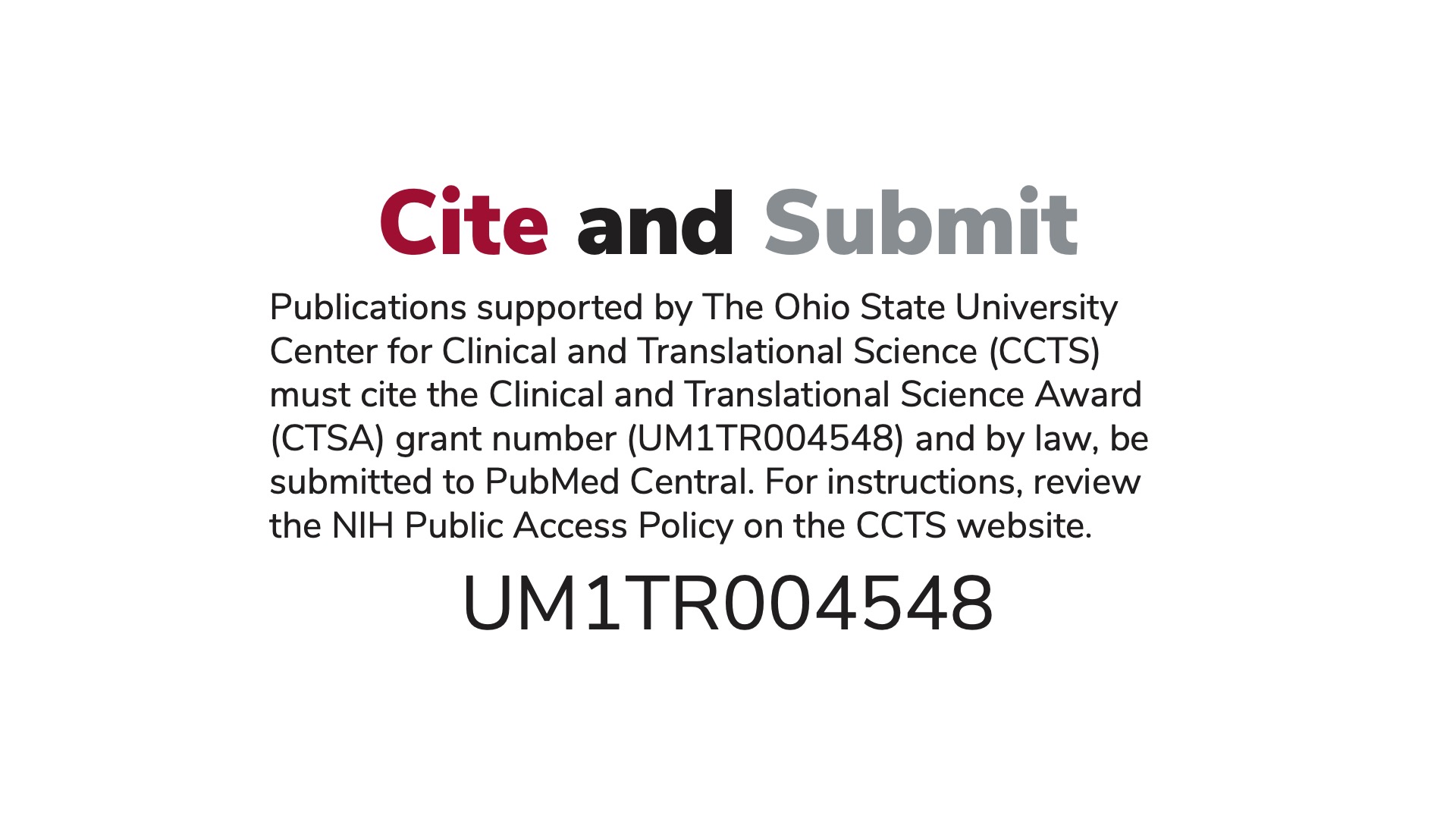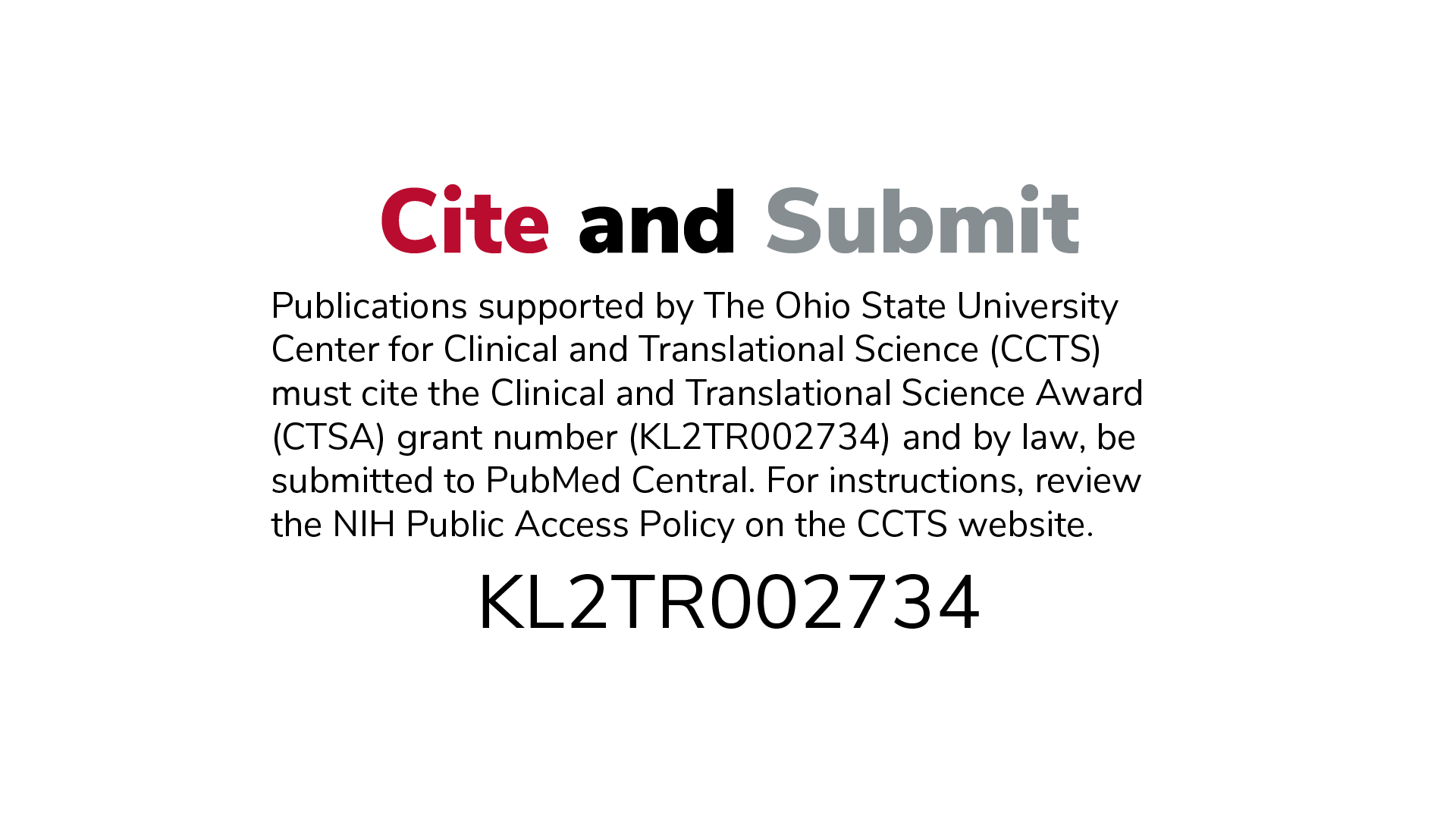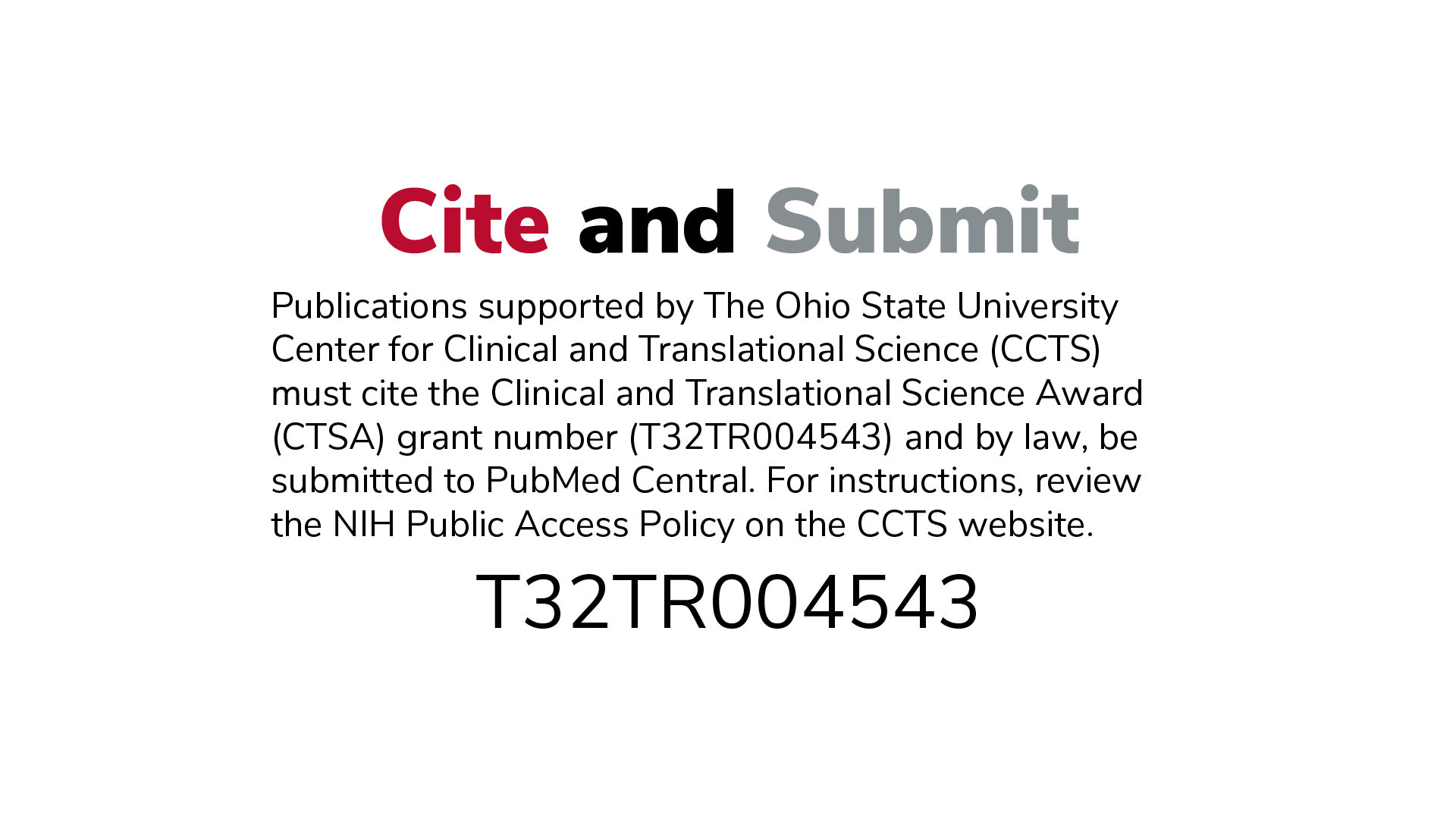Acknowledging the CCTS
Cite the Grant
CCTS’s Clinical and Translational Science Award (CTSA) provides essential infrastructure, resources and services that support clinical and translational research at The Ohio State University, Nationwide Children’s Hospital and across Ohio. Publications are essential to showing Congress, the NIH and our partners that CCTS is effective at facilitating translational research. Help CCTS continue to provide essential support for clinical and translational research by using our citation guidelines to credit the CTSA grant.
Since our initial award in 2008, more than 1233 publications have cited the CCTS’s CTSA grant and have been included in progress reports to the NIH. Citing the grant shows the value and impact of the CTSA program at The Ohio State University and other NIH funding.

Citation Guidance
When Are You Required to Cite the CTSA grant?
- When the research was directly funded by CCTS: pilot projects awards, tech development grants, Community-Engaged Scholar Program awards, Research Nexus subsidy awards, KL2, TL1 support
- When the research benefited from CCTS-funded faculty or staff
- When the research relied on CCTS services, resources, facilities, tools or consults such as: CCTS Voucher Award, research navigation, biostatistics, informatics, regulatory support, recruitment and retention support (ResearchMatch, StudySearch, Facebook Ads, etc.), study coordination, technology consults, study design, community engagement and special populations consults
- Resources: toolkits, training workshops, courses, seminars
- Informatics Tools: REDCap, clinical data warehouse, Scarlet, LifeScale
Please consider citing the CTSA grant for these situations:
- When CTSA involvement is less direct, the decision to cite the CTSA grant in papers is at the discretion of the senior author. Given the importance of publications to demonstrating the transformative power of the CCTS, we ask that you consider citing the CTSA
- CCTS involvement that qualifies for citing the CTSA:
- Technical assistance, such as statistical assistance, helped accomplish a portion of the research, but the personnel were only partially funded by the CTSA; If the technical expertise played an important role, then citation of the CTSA may be appropriate
- Faculty with partial FTE from the CTSA grant should consider whether their CTSA funding provided some support for a research project which would qualify for CTSA grant citation
- Other assistance from CCTS personnel may have been important to the research in question; CCTS faculty and staff are often involved in initiating and supporting collaborative research, coordinating critical meetings of collaborators and stimulation of novel ideas; These activities should be considered for citation of the CTSA grant
Recommended Citation Language
Citation language for activities supported after June 1, 2018. For All Investigators:
“This publication [or project] was supported, in part, by the National Center for Advancing Translational Sciences of the National Institutes of Health under Grant Number UM1TR004548. The content is solely the responsibility of the authors and does not necessarily represent the official views of the National Institutes of Health.”
CCTS Voucher Award
"The project described was supported by Award Number UM1TR004548 from the National Center for Advancing Translational Sciences. The content is solely the responsibility of the authors and does not necessarily represent the official views of the National Center for Advancing Translational Sciences or the National Institutes of Health."
KL2 Scholars
“This publication [or project] was supported, in part, by the National Center for Advancing Translational Sciences of the National Institutes of Health under Grant Numbers KL2TR002734 and UM1TR004548. The content is solely the responsibility of the authors and does not necessarily represent the official views of the National Institutes of Health.”

TL1 Scholars
“This publication [or project] was supported, in part, by the National Center for Advancing Translational Sciences of the National Institutes of Health under Grant Numbers T32TR004543 and UM1TR004548. The content is solely the responsibility of the authors and does not necessarily represent the official views of the National Institutes of Health."

Path to K Scholars
For awardees from a health science college other than Medicine:
The project described was supported by a Path to K award from The Ohio State University Office of Health Sciences and the Center for Clinical and Translational Science. The content is solely the responsibility of the authors and does not necessarily represent the official views of the university, or the Center for Clinical and Translational Science.
For College of Medicine awardees:
The project described was supported by a Path to K award from The Ohio State University College of Medicine Office of Research and the Center for Clinical and Translational Science through the Richard P. Marie R. Bremer Medical Research Fund and William H. Davis Endowment for Basic Medical Research. The content is solely the responsibility of the authors and does not necessarily represent the official views of the Davis/Bremer Research Fund, the Center for Clinical and Translational Science, The Ohio State University Wexner Medical Center or the university.
REDCap
Study data were collected and managed using REDCap electronic data capture tools hosted by the Clinical and Translational Science (CCTS) at The Ohio State University Center. REDCap (Research Electronic Data Capture) is a secure, web-based application designed to support data capture for research studies. It provides an intuitive interface for validated data entry, audit trails for tracking data manipulation, automated export procedures for seamless data downloads to common statistical packages and procedures for importing data from external sources.
*Harris PA, Taylor R, Thielke R, Payne J, Gonzalez N, Conde JG. Research electronic data capture (REDCap) - A metadata methodology and workflow process for providing translational research informatics support, J Biomed Inform. 2009 Apr:42(2):377-81.
NIH Public Access Policy:
Investigators are required to acknowledge federal funding on research publications, press releases, requests for proposals, bid invitations and other documents supported in whole or in part with NIH funds. Authors are required to comply with the NIH PublicAccess Policy, which includes submission, upon acceptance for publication, of an electronic version of the final, peer-reviewed manuscript to PubMed Central. The NIH will not acknowledge any publications not in compliance with this policy and may withhold funding on grants not in compliance. Compliance is monitored via a PubMed Central ID (PMCID), which must be included in bibliography listings of these publications.
Please note:
The CCTS is happy to handle the Public Access submission process for publications in journals that do not automatically submit through the NIHMS portal.